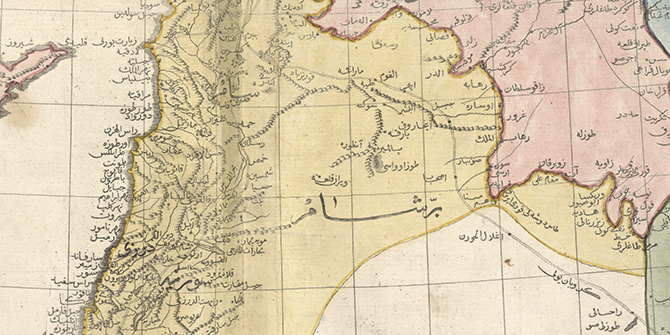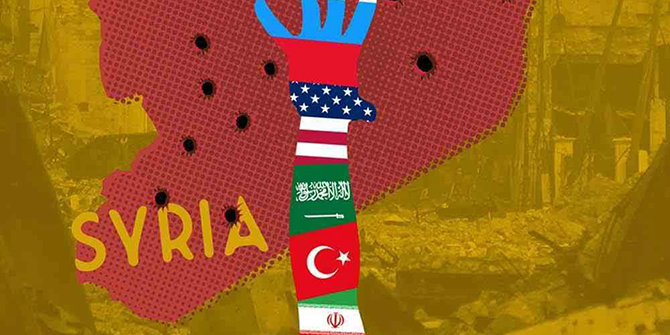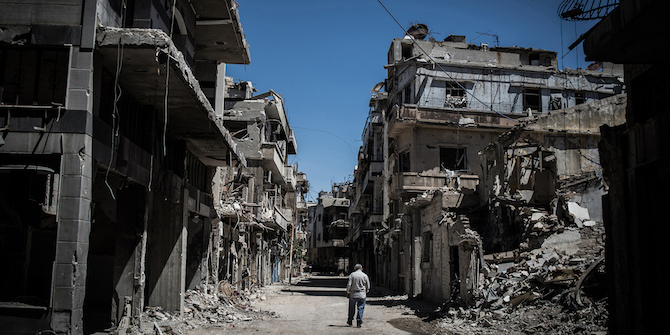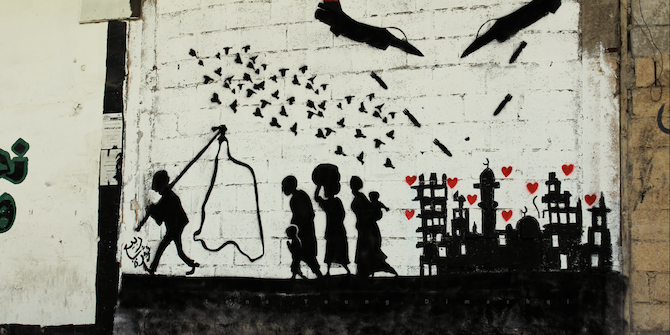by Sara Salim
The Syrian conflict became even more complex after intensified military action by the West in response to the Paris attacks, Beirut bombings and the downing of a Russian civilian aircraft over Sinai. The West so far hasn’t been able to achieve its goals, and its failure to remove Bashar al-Assad has displaced millions of Syrians and left a quarter of a million dead.
It is absurd that disagreements primarily revolve around the political survival of the man whose regime now only controls 25 per cent of Syrian territory, with the remaining unlikely to resubmit itself to brutality. To get to the bottom of this conflict, we need to examine the forces behind Assad: Iran and Russia. Their alliance is a ‘marriage of convenience’ in solidarity of both crippling under economic sanctions. More importantly, Iran served as the gateway to the Middle East for Russia because Iran’s influence on the ground in Afghanistan, Iraq and Syria often surpasses Russia’s. Russia’s influence stems primarily from their military prowess. This marriage, however, is about to disintegrate: Iran is steadily accumulating more bargaining power as it races to meet its commitments from July’s historic nuclear agreement with the P5+1 to have years of sanctions lifted by the end of the year. This will unlock billions of dollars of international investment opportunities; in the medium term, some financiers predict that Iran’s GDP will exceed Saudi Arabia and Turkey’s. Russia is not so welcoming of these developments because the reintroduction of Iranian oil in the markets can push prices down to almost $15 a barrel in 2016. Oil and gas constitute close to fifty per cent of Russia’s national budget and there remains a strong relationship between falling oil prices and a falling national budget. In light of plunging oil prices, Iran is in a powerful position to choose whether it cares to cushion Russia’s economic fall.
As Iran seeks to make up for years of isolation by rigorously engaging international partners, these nations can push for a diplomatic solution. China, the world’s second largest economy, is worried about its huge dependency on Middle Eastern oil imports. These are vulnerable to disruptions, caused by the region’s unpredictable political situation, that adversely impact the financial markets. The Middle East supplied China with 52% of its total oil consumption in 2014 and since China’s energy needs are projected to grow further, it is desperate for stability in the region. In the meantime, Iran is drafting up a comprehensive plan to draw Chinese investors in the field of nanotechnology in hopes the Chinese will incorporate Iranian technology into their manufacturing industry. This is a perfect platform for Iran to penetrate global technological markets. In return, China is perfectly positioned to push Iran towards reaching stability in Syria.
Iranian oil company Khazar is pursuing dialogue between Iranian oil minister and Brazilian minister of energy and industry to enable acquisition of Brazil’s advanced technological expertise in deep water drilling. To secure its position as a major energy exporter, Iran needs a partner to help it successfully extract petroleum beneath the deep waters of the Caspian Sea. Brazil can use this leverage to pull Iran away from Russian, skill and steer the course for a settlement in Syria.
India, on the other hand, can utilise the solid cultural, political and economic ties it has with Iran. It was already Iran’s trusted partner before the end to negotiations with the P5+1 was in sight. They are the second largest buyer of Iranian oil and with India’s GDP growth projection standing at 7.46% in 2016, its appetite for energy looks insatiable. As sanctions are lifted and closer economic cooperation becomes even more crucial, India must use this platform to encourage discussions to end the conflict.
We can also turn to Iran’s key dependence on Japan to fulfill the conditions for the end of the nuclear accord, which is to establish a nuclear security center. The painful lessons the Japanese have learnt from the Fukushima meltdown in March 2011 are essential for earthquake-prone Iran to manage and try to avoid similar catastrophes. Admittedly, Japan is not one to meddle in multilateral conflicts, but they have the capacity to influence Iran and must use it since nobody else can offer Iran this niche expertise.
In light of Iran and Russia’s crippling marriage, Iran’s economic partners could be key in reaching an ultimate solution in Syria. Where they to pressure Iran, it can, in turn, push for a compromise: Assad would be included in the political transition process in Syria as a mere figurehead with no actual power, and no participation in future elections and once the transition is over, the final step is to rid of him permanently. These plans need to be communicated with utmost clarity and be certainly guaranteed. The guarantee we need stems from pressure applied by the countries detailed above, together with all other countries Iran needs to approach as its economy transforms from an autarky to an open economy. The process of ending the war by Assad himself is more likely to happen if pressure was applied by his newly economically powerful ally Iran, not his enemies. Only then can we end Assad’s governing authority in a relatively peaceful manner and reach an acceptable government establishing itself in Syria.
 Sara Salim is a risk analyst at an Investment Bank and is looking to pursue a side career in journalism. Her topics of interest include international relations, foreign affairs, finance and economics with articles published on Project Firefly. She holds a BSc in Economics from University College London. She tweets at @sararuz.
Sara Salim is a risk analyst at an Investment Bank and is looking to pursue a side career in journalism. Her topics of interest include international relations, foreign affairs, finance and economics with articles published on Project Firefly. She holds a BSc in Economics from University College London. She tweets at @sararuz.








It seem’s that you aren’t so good in “risk analyst”. Doesn’ÿ you learned what has happened to Afghanistan, Iraq, Libya, now failed states, when we “helped” them to get regim change?
Fantasies are different from the real world.